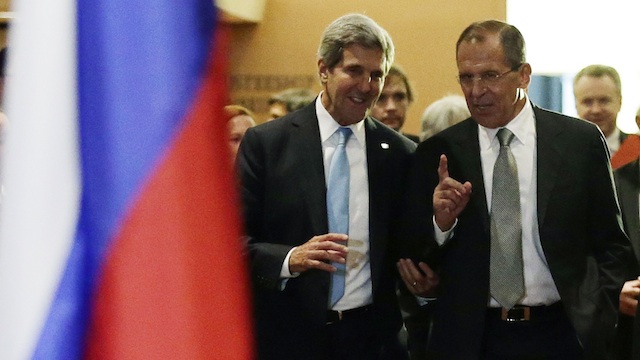SUMMARY
This is AI generated summarization, which may have errors. For context, always refer to the full article.

UNITED NATIONS (UPDATED) – The major powers inched toward a UN Security Council resolution to back the destruction of Syria’s chemical weapons on Wednesday, September 25 as UN experts resumed the hunt for evidence of poison gas attacks.
But wrangling within the Syrian opposition dealt a new blow to hopes for a peace conference to end the 30-month-old conflict that the UN says has left well over 100,000 dead.
Russia and the United States are negotiating a Security Council resolution to legally enforce the disarmament plan that they agreed to head off a US military strike.
Some western envoys said important progress has been made on the resolution. One said there was agreement on “the main points” of a text which could be put to the 15-member Security Council.
The envoy said it could allow for a resolution that allows for a later vote on sanctions under Chapter VII of the UN Charter if President Bashar al-Assad fails to honor the Russia-US plan.
Russian officials denied however that there was any agreement on potential sanctions.
A senior State Department official cautioned to Agence France-Presse: “We’re making progress but we’re not done yet.”
US President Barack Obama told the UN General Assembly on Tuesday there had to be a “strong” resolution and French leader Francois Hollande said it must include the threat of eventual “coercive” measures.
But Russia, Assad’s major backer, has fiercely opposed any move to allow eventual sanctions or military force under the UN Charter.
US officials said progress was made in talks between US Secretary of State John Kerry and Russian Foreign Minister Sergei Lavrov on Tuesday.
A UN team led by Swedish expert Ake Sellstrom travelled in an overland convoy from Beirut to Damascus on Wednesday.
After determining that sarin gas was used in an August 21 attack near Damascus, the team must now try to get to up to 14 sites where allegations of chemical weapons use have been made.
During a meeting with the foreign ministers of the Security Council permanent members – Britain, China, France, Russia and United States – UN leader Ban Ki-moon raised the Russia-US disarmament plan as well as efforts to convene a peace conference, said a UN spokesman.
The UN leader called the meeting to urge the major powers to overcome deep divisions over the conflict.
New divisions hit Syrian opposition
But prospects for a follow up to a peace conference held in Geneva in June last year took a blow with a new rift in the Syrian opposition.
Thirteen key Syrian Islamist groups said they did not recognize any foreign-based opposition group, including the main Syrian National Coalition, which has its headquarters in Turkey.
The Islamists include members of the main rebel Free Syrian Army and the radical Al-Qaeda-affiliated Al-Nusra Front.
Other troubles emerged when Free Syrian Army commander Methkal Albatich said in Paris that more than 100 senior rebel officers had signed a petition demanding a “boycott of any conference or discussion which involves Iran in one way or the other.”
The FSA’s authority has been significantly weakened, however, by the move by Islamist groups to break with the Western-backed National Coalition.
“It’s extremely damaging,” Charles Lister, an analyst at IHS Jane’s Terrorism and Insurgency Centre told Agence France-Presse.
The groups “represent a very significant portion of the armed opposition and the groups that have had the most strategically valuable impact.”
Countries suffering the fallout from the Syria conflict have stepped up calls for international help at the UN General Assembly.
Britain on Wednesday gave an extra 100 million pounds ($160 million) to the humanitarian effort.
Total British aid for Syria now amounts to more than 500 million pounds, according to Deputy Prime Minister Nick Clegg, who announced the cash boost on the sidelines of the UN summit.
“The scale of what is unfolding in Syria is almost beyond comprehension and is certainly on a scale of humanitarian suffering that the world had not had to confront in a long period of time,” Clegg told reporters.
On Tuesday, September 24 Obama announced $340 million in humanitarian aid for Syrians, bringing the US contribution to $1.3 billion.
But the UN still has a huge funding shortage for its operation to help more than two million Syrians in Lebanon, Jordan, Iraq, Turkey and Egypt and about six million are displaced inside the country. – Rappler.com
READ MORE: The Crisis in Syria
Add a comment
How does this make you feel?
There are no comments yet. Add your comment to start the conversation.